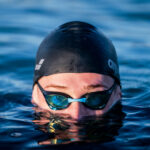Night Swimming in Open Water
Swimming at night in open water can be a magical experience. Here are some dos and don’ts to keep in mind before you jump into the lake or ocean.
There’s something about doing a favorite outdoor sport at night that adds a layer of excitement. It seems a bit exotic and surreal, whether you’re cross-country skiing by the light of the full moon or mountain biking with a headlamp.
Swimming is no different. Taking a midnight dip in the ocean might be something most people expect teenagers to do, but the darkness and the mesmerizing lapping of the water create an unforgettable experience for swimmers of all ages. Slipping into the lake or sea on a warm summer night makes you feel truly alive: it’s relaxing and invigorating at the same time. Maybe it’s the peacefulness, with the daytime crowds gone, combined with the hint of danger (or the risk of discovery, if you’re skinny-dipping). You can watch the stars above and the lights twinkling on the shoreline, and, if you’re lucky, you might even catch a glimpse of bioluminescence in action.
Night swimming is amazing, but don’t get so lost in the moment that you forget to use common sense. Here are a few tips to help make the experience a positive one.
Don’t go alone. You know you’re not supposed to swim alone, and that goes double for swimming in open water and triple for swimming in open water at night. Chances are, nothing will happen; but don’t take unnecessary risks.
Do be informed. Check the tide schedule and ask about unusual currents if you’re unfamiliar with the area. Pay attention to signs warning of dangers such as jellyfish or riptides.
Don’t go beyond your depth. Swim parallel to the shore if you can. If you’re swimming out and back, measure your effort carefully to make sure you have enough energy to get back to shore.
Do make sure there is adequate light. Moonlight can be bright enough, but starlight alone generally isn’t. You don’t want to find yourself in a pitch-black environment if a cloud suddenly covers the moon. Marathon swimmers and their escort kayakers use a variety of lamps, strobe flashers, glow sticks and LED lights to see and be seen. If you’re planning to swim very far, you and your companions might want to check out some of these options to help keep track of each other. (Note, though, that depending on where you’re swimming, lights can attract uninvited sea creatures.) If the shoreline is dark, place a lamp of some kind to mark your entry point so you don’t lose your bearings.
If you’re intrigued by the idea of swimming at night but can’t convince anyone to go with you, some clubs do offer guided, organized night swims, or even night races. Night swimming is memorable — definitely something for the bucket list!
Do you have any night swimming experiences to share?







